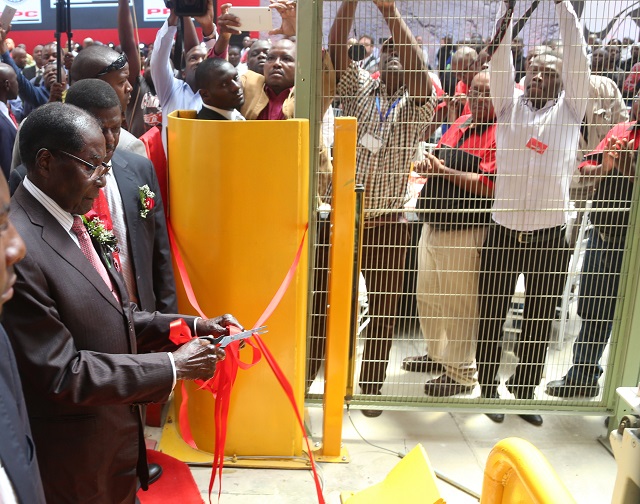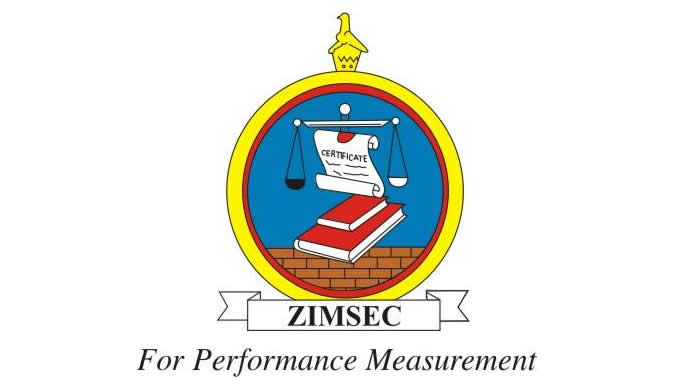President commissions $82 million cement plant


President Mugabe cuts a ribbon to officially open the PPC Harare plant while other guests look on in Msasa yesterday (Picture by Believe Nyakudjara)
Tendai Mugabe, Harare Bureau
The country’s economic blueprint, Zim-Asset, and the 10 Point Plan, yesterday received fresh impetus after President Mugabe commissioned a highly mechanised cement processing plant constructed by PPC Zimbabwe in Harare’s Sunway City Industrial Park, with an annual output of 700 000 tonnes.
The $82 million mega plant is likely to see a steady decline in cement prices and is also part of a broader answer to the country’s quest for industrialisation, employment creation and rapid infrastructural development.
Although PPC Zimbabwe had secured a $85 million loan facility from PTA Bank, the company financed the project to the tune of $82 million within a record time of 18 months.
President Mugabe, who was the guest speaker at the commissioning of the plant, said the massive investment by PPC Zimbabwe was ample evidence that the country’s indigenisation laws were not meant to inhibit foreign direct investment. In any case, the President said, the laws sought to protect foreign investments.
“Government notes with satisfaction that in 2012, PPC Zimbabwe complied with indigenous shareholding requirements of the Indigenisation and Economic Empowerment, making it one of the major manufacturing companies to be compliant – that is 51/49 requirement,” he said.
“By so doing, PPC Zimbabwe has demonstrated what many other companies are still struggling to put in place and it has demonstrated also that the indigenisation and empowerment philosophy is no hindrance to foreign investment, but instead the policy guarantees the security of such investment.
“In this regard, it is important to note that in its indigenisation and implementation plan, PPC Zimbabwe has allocated 10 percent equity to the Community Share Ownership Trusts whose beneficiaries are the Gwanda and Umguza rural districts.
“Furthermore, an Employee Share Ownership Trust with a total shareholding of 9,7 percent equity has been established, a consortium of indigenous Zimbabweans has acquired 4,9 percent in the company, while the National Indigenisation and Economic Empowerment Fund have a shareholding of 9,7 percent.
“I am also informed that the company contributed $3 million to the Community Share Ownership Trusts. This has been shared between Umguza and Gwanda Community Share Ownership Trusts. Furthermore, PPC Zimbabwe supports the broad based indigenisation and economic empowerment programme through paying dividends to its shareholders. Community Share Ownership Trusts received $200 000 in dividends in 2016 alone.”
Given the plant’s capacity, President Mugabe said, the company would significantly contribute towards meeting the country’s cement requirements.
Said President Mugabe: “I am reliably informed that the PPC plant, the newest and among the largest in the country uses newest and exceptional technology and has an annual production capacity of 700 000 tonnes of cement.
“The plant production capacity is expected to increase from 1,1 million tonnes to 1,8 million tonnes per annum, placing it in a position to comfortably meet the national demand estimated at just below a million tonnes.
“The new plant will create 87 additional jobs, bringing the total employment to over 400 permanent workers. PPC’s ability to create employment is indeed with the objectives of Zimbabwe Agenda for Sustainable Socio-Economic Transformation (ZimAsset) and the 10 Point Plan which seek to grow the economy, accelerate wealth creation, achieve sustainable development and social equity through empowerment and employment creation.
“10 Point Plan equal to 10 commandments, perhaps. I am aware that besides this Harare plant, PPC Zimbabwe has two other plants in Bulawayo.
“The cement company has in fact provided various construction products and solutions for the Harare, Victoria Falls and the Joshua Mqabuko Nkomo international airports, the National Railways of Zimbabwe headquarters building in Bulawayo and Lake Mutirikwi Dam wall in Masvingo. It is pleasing to note that a number of local companies were contracted to work on these construction projects.”
Industry and Commerce Minister Mike Bimha said: “PPC Zimbabwe has grown to be the largest cement manufacturer in Zimbabwe, with obviously, through Government support, through import management and national project status and other measures. It is the first local company to build a state-of-the-art factory here, a place that we call Sunway City Industrial Park – a designated Special Economic Zone.
“PPC Zimbabwe is a fine example that with appropriate policy support and responsible use of funding, companies can re-tool and re-equip. Government through the Ministry of Industry and Commerce is committed to facilitate sustainable industrial and commercial growth for socio-economic growth of the country.”
Minister Bimha said Government would continue to support the industry and remove obstacles that discourage industrial growth.
He described the investment by PPC Zimbabwe as a vote of confidence in Zimbabwe’s economy, adding that the country was open for business. He said Government wanted to replicate the Sunway City industrial park model to other towns across the country.
PPC Group chairman Mr Peter Nelson said: “The needs, expectations and dreams of our growing population include homes and infrastructures and while there may be bumps along the way in providing these, there will also be many opportunities for us all to play a meaningful role in meeting these.
“PPC and PPC Zimbabwe stand ready to play our part in improving life of our growing population. Converting these opportunities into sustainable solutions that meet Africa’s and indeed Zimbabwe’s needs which requires a unique approach.”










Comments